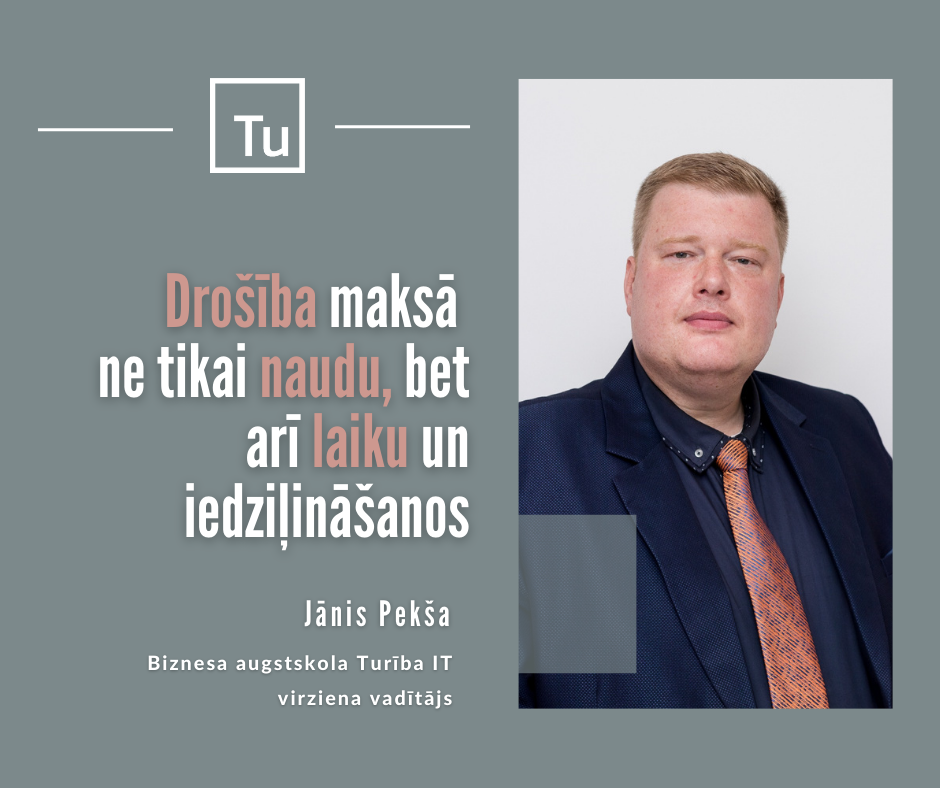Jānis Pekša,
Head of the IT department of the School of Business Administration “Turiba”
The digital transformation is gaining momentum, and our increasingly active ‘relocation’ to the Internet is increasing both the interest of criminals and the opportunities for new and emerging forms of fraud. Publicly available estimates suggest that the damage caused by various cyber attacks has increased as much as 57 times in the last six years.
As a result of Russia’s aggression, various cyber-attacks may have become louder and more visible to the public. At the same time, this does not mean that criminals in the Internet environment receive any monetary or other direct benefits in all cases, but they can cause serious problems for us, the users. The fantasies of criminals and also the possibilities are endless, we cannot predict and influence much, but there are things that are worth paying attention to and paying special attention to – both in our private communications and in companies and organizations.
We do not pay attention to the functions of social networking sites
We use a lot of social media sites a lot and often, but we pay little attention to the features and capabilities of these media. For example, on the social networking site Telegram, it is possible to see nearby end users with a possible image and an accuracy of up to one meter. This means that our location may be permanently available to other users. You can deactivate this function or register with the Telegram without providing a telephone number.
Until recently, WhatsApp was able to send a single, identical message to all of its contacts, such as an external link. By clicking on it, we could each send a message to all our contacts plus we could still go to a website without us even knowing it. With regard to WhatsApp, our data is available to the International Criminal Police Organization (Interpol), and at present we, like Signal and Telegram, are no longer able to send them all by hand, and this makes it very difficult to commit fraud.
Many users still do not know what Two-Factor Authentication means. To reduce the possibility that fraudsters or criminals may access our email, such as Inbox.lv and Gmail.com (a user account is linked to a smartphone), if someone tries to guess your password or start doing any unusual activity, we will receive an email about such activity. If the password is entered correctly, a message will appear on your smartphone stating that this is really you? This, of course, is cumbersome for the user, as authentication is required each time a smartphone is authenticated. However, we are increasingly aware that we can pay for security not only in cash, but also by investing our time and knowledge.
We recently experienced a case where the operation of Inbox.lv was paralyzed for several hours. The fraudsters did not get any direct benefit in this case, only the users did not have access to the e-mail for several hours. Access to these emails could result in data loss. Such a “classic” attack does not directly allow criminals to access the data.
Research shows that we cannot “relax”
As for the data security of organizations, it is worth noting PricewaterhauseCoopers’ (PwC) recent survey, PWC’s Global Economic Crime and Fraud Survey 2022, which surveyed top executives in 57 countries. The data show that with slow stagnation, however, the number of cyber attacks is declining slightly compared to 2018, when such studies were launched. At the same time, although declining, the types of fraud are becoming longer and more complex. Organizations are divided into three parts – large companies with a turnover of one billion, medium and small. There are three types of threats: cybercrime, customer fraud and misappropriation of assets. In order for the threat to become a reality, various crimes are organized, which are directed at companies engaged in production, financial services, energy, health technologies, etc. In the context of the Ukrainian war, we see that companies are not only “bombarded”, but also denied access to e-mails, websites, etc. Therefore, there is no way we can “relax”. If we look at Covid-19 in the context of economic crime, 70% of those who have experienced fraud have experienced new cases of fraud caused by Covid-19.
Email is still a popular scam tool
Emails are still one of the most common scams. We still receive emails that include opportunities to win large sums of money, a notice of inheritance, or the like. People are less and less likely to catch such messages. However, a relatively newer form of fraud is the bill from a company that is very popular and well known. The invoice is in the email attachment, which should normally include a PDF extension file. However, the attachment of the fraudulent is not a PDF file, but an unknown extension – it is recommended to delete them immediately and never open them.
It is also advisable to inform the organisation’s technical service to prevent five colleagues from realizing that this is malicious email, while a sixth opened it, downloaded it and tried to open an unknown file several times.
One of the most popular ways is to set the e-mail server settings of these organizations to indicate in the subject line of the e-mail message that the e-mail message is from outside the organization that more attention should be paid to the e-mail, such as “[Ārējs] Invoice for the month of May ”. In this way, the recipient is alerted, thus reducing the risk of being ‘caught’. This practice has long been used in large IT companies both in Latvia and in the world. Alternatively, to avoid risks, all e-mails are checked with different filters to identify whether the particular message is intended for employees or customers of the organization. There is often a way that executable files can be blocked immediately and not allowed down to the user level. For example, files with the extension “.zip” or “.rar” are not e-mailed to users at all.
Specialists are trained, but others have to learn on their own
Personally, I once thought for a long time whether to open one e-mail attachment or not, it was prepared in a very good Latvian language, one of the popular services available in Latvia was used. The email was so well prepared that the only hint that something was wrong was the realization that I had already received an invoice from this company a week ago. Usually the e-mail of this company has a signature – a specific logo (for example, thank you for being our customer, for communication), in this case there was a simple signature – Jānis Bērziņš without a logo. It “handed over” the message, and the email was marked as spam and deleted. In this case, the fraudster gains nothing. However, when a new user is created, they can connect to the computer remotely and fraudsters look at, for example, the bank user name and password that the user enters, or data is copied from the computer or the content of the e-mail is read. without any hesitation.
Some IT companies in Latvia create their own internal audit by sending such fraudulent e-mails to their employees, trying to see and observe whether the user is “caught”. The company thus trains its employees, who are IT specialists, and therefore more knowledgeable in the field of Internet data security. Others, unfortunately, get caught more often.
Therefore, I call on anyone who, along with the general digital transformation and “migration” to the Internet environment on a daily basis, is inevitably forced to stay in it more and more, to find time and opportunities to keep up with security issues on the Internet. Just as it seems a matter of course to drive a car for a roadworthiness test in order to be able to travel safely on the roads, it would also be a matter of course to allow time for basic internet safety issues so that we can operate safely in this environment.
–


